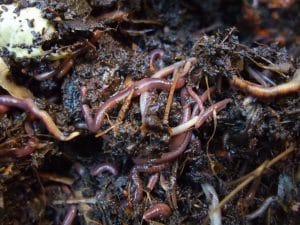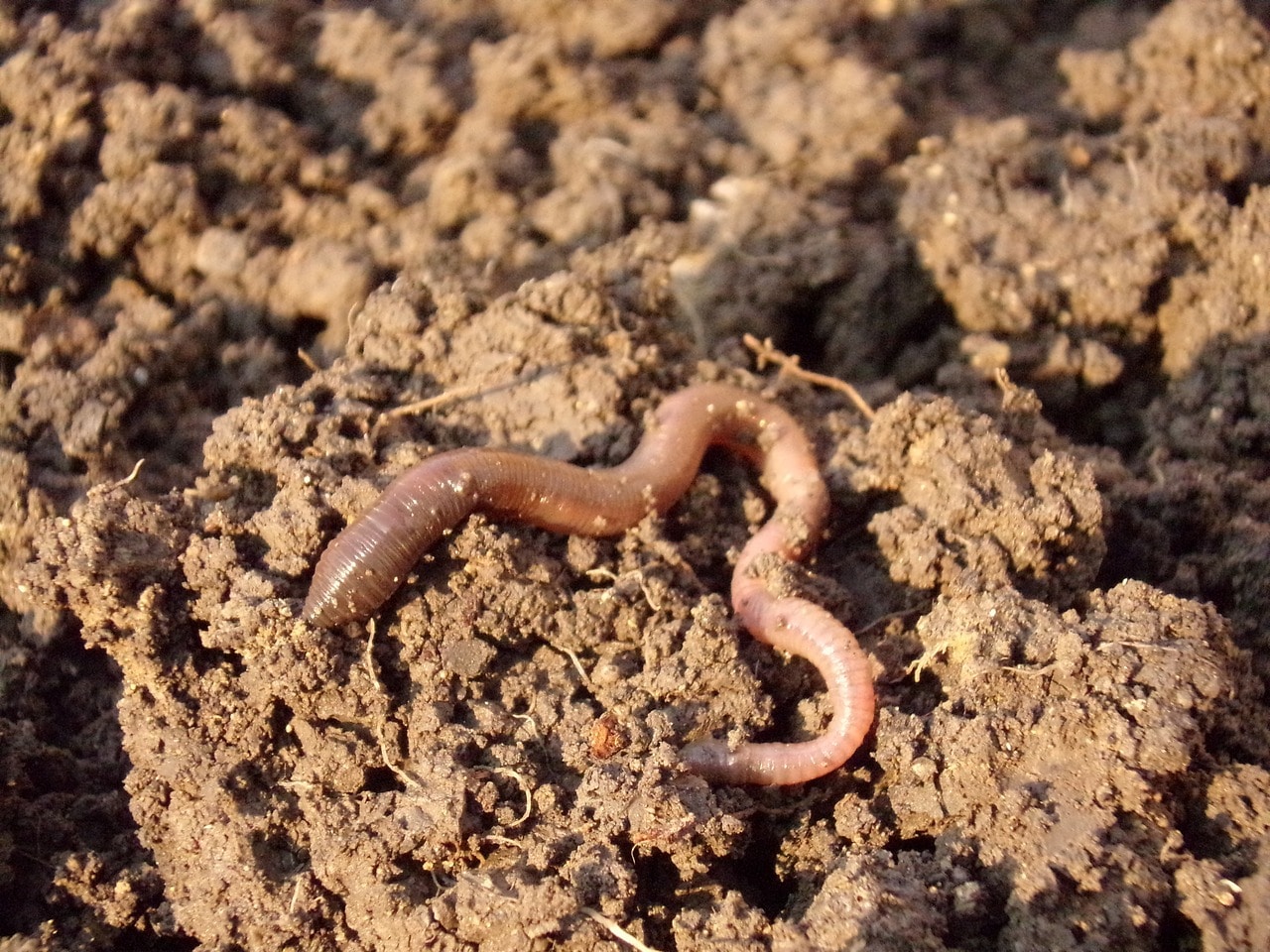Yes, certain types of pesticides can kill earthworms if not used with care. Earthworms are beneficial for maintaining healthy soil. However, pesticides may be applied without causing a reduction of earthworms population if you follow some rules in order to minimize the effect of pesticides.
Under normal environmental conditions, however, the pesticides don’t reach the deeper level of the soil where earthworms live and usually, they are not sprayed in a high concentration that can affect them.
But, as we’ll see soon, certain weather conditions like rain and humidity can increase the pesticide effect.

Why we are talking about earthworms and pesticides?
Pesticides are usually used on crops or yards in order to promote the growth of plants or to get rid of certain weeds. But, in this process, the earthworms living under the soil can be affected. The effects of pesticides on worms include making them grow only half-size and half-weight and also influencing the reproduction rate. (source)
Earthworms population is a good indicator of soil health and it improves soil fertilization by moving through it. It’s not a coincidence that Aristotle called them the “intestines of the Earth”. Earthworms create a tunnel network through the soil helping the water and air to pass through. They also help the soil by carrying nutrients, organic substances and mixing them into the soil.
What types of pesticides harm earthworms?
There is no pesticide that is labeled as an earthworm killer or against earthworms, however, certain pesticides are affecting the earthworms population especially if environment conditions include rain or high humidity.
Under normal conditions, pesticides don’t penetrate the soil that much to affect earthworms, but, as we pointed out above, rain can increase the pesticide concentration at the lower levels of the soil.
Sevin is one of the worst pesticides for earthworms. And one of the most popular pesticides that affect earthworms. While it is not labeled as an earthworm killer, the toxicity is very severe and according to studies, it can reduce the population of earthworms by up to 76-100%.
A study at Agriculture, Food and Environment of the University of Kentucky studied the toxicity of certain pesticides to earthworms. The toxicity level represents the population reduction after applying the pesticide.
We have four levels of toxicity:
- Low Toxicity (0% to 25% reduction of the population)
- Moderate Toxicity (26% to 50% reduction of the population)
- Severe Toxicity (51% to 75% reduction of the population)
- Very Severe Toxicity (76% to 100% reduction of the population)
Here is the most severe pesticide list
| Pesticide name | Brands | Toxicity Level (percent of population reduction) |
|---|---|---|
| Chlorothalonil | Bravo | 0-25% |
| fenarimol | Rubigan | 0-25% |
| fosetyl | Al Aliette | 0-25% |
| iprodione | Chipco 20619, Rovral | 0-25% |
| mancozeb | Dithane M-45, Manzate 200 | 0-25% |
| metalaxyl | Ridomil, Subdue | 0-25% |
| myclobutanil | Nova, Rally | 0-25% |
| propiconizole | Banner, Tilt | 0-25% |
| tebuconazole | Folicur | 0-25% |
| triadimefon | Bayleton | 0-25% |
| dicamba | Banvel | 0-25% |
| dithiopyr | Dimension | 0-25% |
| isoxaben | Gallery | 0-25% |
| pendamethalin | Pre-M, Prowl, Herbicide 2 | 0-25% |
| prodiamine | Kerb | 0-25% |
| 2,4-D | 2-4,D | 0-25% |
| trichlopyr | Garlon | 0-25% |
| azadirachtin | Margosan-O | 0-25% |
| bifenthrin | Talstar | 0-25% |
| cyfluthrin | Baythroid, Tempo | 0-25% |
| fluvalinate | Mavrik | 0-25% |
| isophenphos | Oftanol | 0-25% |
| flurprimidol | Cutless | 0-25% |
| mefluidide | Embark | 0-25% |
| chlorpyrifos | Dursban, Lorsban | 26-50% |
| diazinon | Diazinon, Spectracide | 26-50% |
| isazofos | Triumph | 26-50% |
| trichlorfon | Proxol | 51-75% |
| thiophanate | Fungo, Cleary-3336 | 51-75% |
| thiophanate-methyl | Topsin-M | 51-75% |
| benomyl | Benlate, Tersan-1991 | 76-100% |
| bendiocarb | Turcam | 76-100% |
| carbaryl | Sevin | 76-100% |
| ethoprop | Mocap | 76-100% |
| fonofos | Crusade, Dyfonate | 76-100% |
| phorate | Thimet | 76-100% |
University of Kentucky Study (source)
Most insecticides will not get deep enough into the soil to affect worms, so this toxicity is greatly reduced if not combined with the environmental conditions mentioned above.
What are the recommended pesticides?
Recommended pesticides that don’t affect earthworms are:
- Neem Oil
- Insecticidal Soap
- Low toxicity pesticides
Neem Oil
There are pesticides that are actually beneficial for earthworms like neem oil. But, make sure it’s not in a product mixed with another pesticide that is harmful to earthworms. Neem oil increases the earthworm activity producing an opposite effect comparing to normal pesticides. (source)
Neem oil is a natural pesticide and can be found in a variety of pesticide products today. The neem oil is also found in other cosmetic products like toothpaste, pet shampoos or soaps.
Insecticidal Soap
Earthworms are considered soft-bodied animals and insecticidal soap is harming the soft-bodied insects at contact as they consist of fatty acids but it doesn’t have any effects after drying. The insecticidal soap is not harming beneficial earthworms unless it’s mixed with other pesticides or is in very high concentration. It’s usually applied on cooler days because it dries very quickly.
Low toxicity pesticides
Other pesticides that are safe for earthworms can be found in the table above. Some of the low toxicity pesticides are:
- Chlorothalonil – Can be found in products like Bravo
- Fosetyl-Al – Can be found in products like Aliette
- Pendimethalin – Can be found in products like Herbicide 2 Pre-M, Prowl,
- Cyfluthrin – Can be found in products like Baythroid, Tempo
What benefits do earthworms offer?
Earthworms are considered beneficial creatures and killing them is a bad idea. They help the soil by:
- fertilizing soil
- creating small tunnels for air (aerate) and water passage
- helps rainwater to go through the soil by burrowing
- helps plants establish stronger roots
- mixing the organic matter and nutrients
- consume residue material and convert it into fertilizer for plants
Still not convinced? Watch this great video explaining the amazing and hidden world of earthworms.
(source)
Does permethrin kill earthworms?
Permethrin can affect earthworms as they are ascarids. But, considering the wide area of spraying and the small concentration that reaches the deeper levels of soil where earthworms are present, it doesn’t affect them to a great extent.
Does pyrethrin kill earthworms?
Pyrethrin is not typically affecting the earthworms population. However, high concentrations, applying before rain or applying on earthworms near the surface of the soil can cause damage to the earthworms population.
Does Nitrogen kill earthworms?
Yes, excessive use of Nitrogen can kill earthworms populations because earthworms are effected by acid solutions with a low pH (<6). To avoid the effects of Nitrogen on earthworms only apply pesticides on small patches rather than on the whole soil.
Also, avoid using pesticides when the earthworm activity is high and they are near the surface. Earthworms are near the surface after rains for three main reasons: (source)
- For migration purposes: they can move faster than through soil
- To mate – but only a few species do this
- Raindrops can produce similar signs as predators like moles and they can come to the surface in order to protect themselves.
The earthworm activity is also high during the spring and autumn seasons. Spring makes the snow melts and soils are moist. In the summer, the soil dries and earthworms activity is low (they don’t like the sun either). The same for winter as there are low temperatures and many of them die or head up to the deeper levels of the soil. In the fall, humidity and rain showers increase the earthworm activity at the surface level.

Natural alternatives
If you are using pesticides for the weeds, a simple and natural choice would be to pull the weeds out by hand. You get rid of them cheap and you do a little workout in the process. It’s also more entertaining. This way, you can be sure you’re not affecting the ecosystem.
To make it easier, pull them out of the ground after a rain shower. That’s when the soil is moist and the roots come out easier. It’s also important to pull the whole root out, otherwise, the weeds can come back fast.
Effects of pesticides on worms
Large amounts of high toxicity pesticides sprayed on a small surface can affect earthworms. The most common effects are damaging their sperm and the ability to produce it. Earthworms affected by pesticides do not reproduce as well as the ones who are left alone. (source)
Also, they shrink to half the normal size because of pesticides.
Other effects include damaging their DNA causing cancer or birth defects.
Types of earthworms
The most common earthworms species are:
- Green worm – Allolobophora chlorotica
- Pink soil worm – Aporrectodea rosea
- Southern or purple worm – Aporrectodea trapezoides
- Grey worm – (Aporrectodea caliginosa)
- Red worm – (Lumbricus rubellus).
- Nightcrawler – (Lumbricus terrestris)
Conclusion
Earthworms are beneficial creatures for the maintenance of the soil structure and health. They consume organic matter, mix it in the soil and provide nutrients for plants.
They also help to aerate the soil and improve water drainage.
Most pesticides won’t kill earthworms under normal circumstances and there is no pesticide that’s labeled for killing earthworms (at least in the US).
However, certain conditions can cause the death of earthworms including rain and applying high concentrations of pesticides on a small area. There are natural or low toxicity pesticides that you can use to avoid this effect. Another way would be to use the traditional method of pulling the weeds of the ground.
